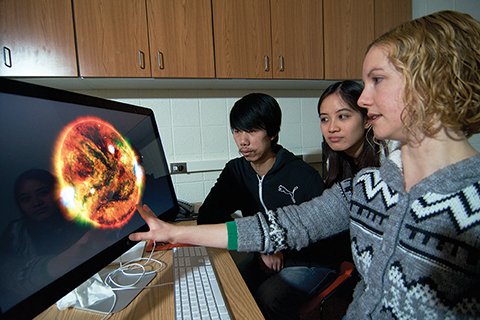Astrophysics
Using data from powerful new technologies, astrophysicists make discoveries that raise new questions about our universe. They study the physics of the universe. They interpret observational data through mathematics and physical laws. Astrophysicists apply disciplines of physics, including mechanics, electromagnetism, statistical mechanics, thermodynamics, quantum mechanics, relativity, nuclear and particle physics, and atomic and molecular physics.
Careers
- University researcher
- Research equipment designer
- Planetarium technician
- Computational astrophysicist
- Solar astronomer
- Cosmologist
- Planetary scientist
- Telescope engineer
- Support astronomer
What will I study?
You will complete core courses in math, physics, and astrophysics and then choose an area of emphasis: professional astronomy, computational astrophysics, secondary education, data-analysis specialist/laboratory scientists, or military reserve officer.
Many students major in both astrophysics and physics, which includes a supervised observation or theoretical research project in their senior year.
You also have access to local and world-class research facilities, including the 30-inch reflector near Minneapolis; 60-inch reflector on Mt. Lemmon near Tucson, Ariz.; Arecibo Radio Observatory; Kitt Peak National Observatory; Mauna Kea Observatory; and the National Radio Astronomy Observatory.

